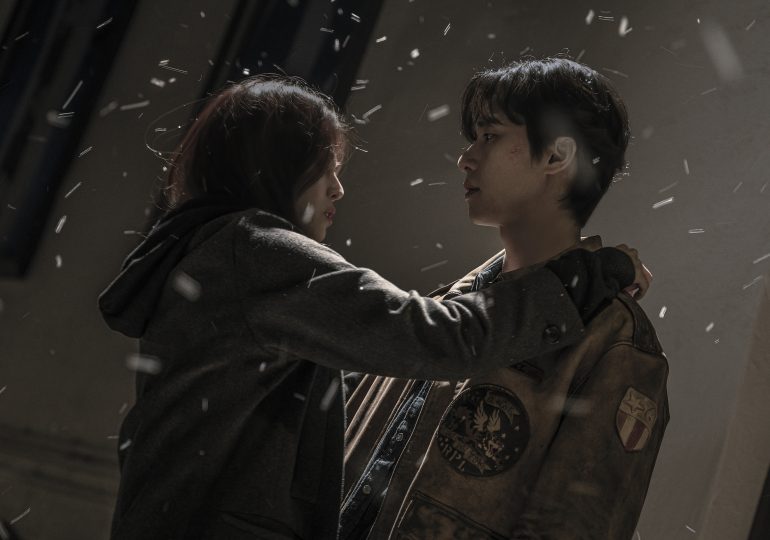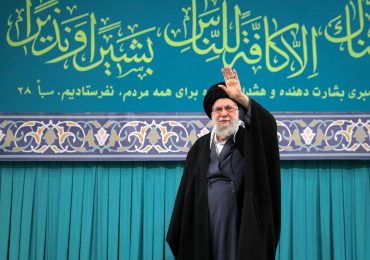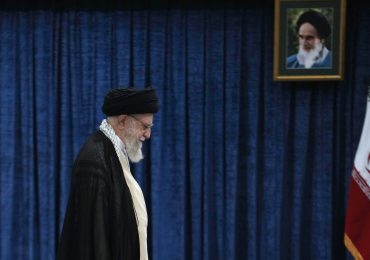Spoilers ahead for Gyeongseong Creature
Seventy-nine years after the main events of Gyeongseong Creature season 1, Park Seo-jun and Han So-hee’s characters meet again on a snowy hillside street in contemporary Seoul. Much has changed on the Korean peninsula since pawn shop gentleman Jang Tae-sang and stoic sleuth Yoon Chae-ok were separated, seemingly by Chae-ok’s death, in 1945. Japanese occupation came to an end with the outcome of World War II, Koreans endured a war and the political fracturing of their country, and South Korea went through a period of rapid economic growth that led to its present day open market capitalist economy.
[time-brightcove not-tgx=”true”]
The second season of Gyeongseong Creature doesn’t have much interest in delving into those developments, staying both vague and symbolic in its depiction of almost a century of historic horrors and triumphs. Instead, season 2 of the supernatural horror, out Sept. 27 on Netflix, stays tightly focused on the characters and what has changed for them since last time. Chae-ok, we learn, survived after being pulled back from the brink of death by a najin, the parasitic creatures at the center of the Japanese’s human experimentations revealed in season 1. In addition to apparent immortality and eternal youth, the najin also gave Chae-ok superhuman abilities that make her particularly good in a fight.
However, ashamed by the vampire-like hunger of the najin that lives inside of her, Chae-ok lives mostly in isolation, emerging from her hideaways only when taking on a missing person case. “In season one, she had a very clear motive, a cause, which was to find her mother,” Han tells TIME Magazine, through an interpreter. “But, in season two, she’s already lost that cause. She’s been living for decades. I think this time around, she wants to be selfless. She wants to live a life that can help others, instead of focusing on herself.”
It’s Park’s Tae-sang, however, who remains the series’ main protagonist—even if he doesn’t remember the events of season 1. When we catch back up with Tae-sang, he is going by a different name, Jang Ho-jae, and has no memory of his supernaturally long history. “Ultimately, my two characters are the same character,” says Park, trying to maintain some of the mystery of his amnesia and how he is still alive. “The difference is his emotional evolution that he’s been through from all this time [living].”
At the start of season 2, the man who goes by Ho-jae is running a detective agency out of the same Jongno-dong building where Tae-sang’s House of Golden Treasure once stood. When his work has him accidentally stumbling into a gruesome murder scene, he is thrown back into Chae-ok’s orbit—and into the path of Jeonseung Biotech, the company that grew out of General Kato’s horrific human experiments seen in the previous season.
While Park, who has starred in popular Netflix dramas like Itaewon Class and What’s Wrong With Secretary Kim, as well as Marvel movie The Marvels, signed on to the drama for “whatever backdrop I was given,” he found the time leap “very interesting” as an actor. Even before Ho-jae begins to remember his complicated past, the qualities that defined Tae-sang as a good-natured, charismatic man with intense loyalty for his friends and community shine through. He doesn’t know about his past, but still, he takes care of the sons, daughters, and grandchildren of the people he lived beside in colonial era Gyeongseong.
“I try to put a distinction between Ho-jae and Taesang, and when Ho-jae begins to remember things,” says Park of his season two performance. “After [Tae-sang] got his memory back, I thought about whether I would use the tone of speech that Tae-sang used in season one, or stick with Ho-jae’s tone of speech.”
If that all sounds like a lot to keep track of, cleverly, season 2 acts as a soft reboot and a new entry point for a series that didn’t quite find the audience it wanted to with its first 10 episodes. “Some people told me that some of the parts [in season 1] were very slow,” director Chung says, when asked if he incorporated audience reactions. The two seasons were filmed back-to-back, which meant any course correction came in the editing process. “I wanted to make it more immersive,” he says. “So if there were parts that were a little bit slow, I try to make it more fast-paced, and if there are stories that are other than the main narrative that I thought were slowing down the pace, I would take those out.”
In addition to a pacing change, Gyeongseong Creature season 2 centers its high-stakes romance more prominently—a smart decision if trying to cater to an international K-drama fandom built on a love story format. “I wanted to give [the audience] the melodrama between the two characters [that] didn’t really happen in season one,” says Chung. “That’s the biggest change.” It’s a genre shift that was part of writer Kang Eun-kyung’s original season 2 intention. “Before we started shooting season two,” says Park, “writer Kang told us that this genre for season two is a melodrama. It’s a love story. And I totally agree that [the] love story is key to season two.”
This is immediately felt in the season’s first episode, which ends with Chae-ok and Tae-sang staring into one another’s eyes, reunited after the better part of a century apart, as snowflakes fall around them. It’s reminiscent of Captain America: The Winter Soldier or Wonder Woman: 1984, two superhero blockbuster sequels that follow their superhuman characters from a period setting into a modern world, and find them struggling to acclimate while reuniting with a loved one they thought long gone. The superhero genre parallels are also evident in the season’s complex, choreographed fight scenes, which see heroes Chae-ok and Tae-sang facing off against Jeonseung Biotech’s shadowy army of najin-enhanced soldiers.
Chung says that such Hollywood blockbusters were reference points for Gyeongseong Creature character-driven action in the second season. “For Seo-jun, I thought Captain America’s style would really befit his character in a very impactful, forceful and very strong way,” says Chung. “And for So-hee, maybe more swift and quick, [a very edgy kind of action] which requires a lot of rehearsals that So-hee so diligently did.” Han, who has previously taken on elaborate fight scenes in Netflix crime thriller My Name, gets more opportunity to show off her action chops in season 2. When asked why viewers should consider watching the sophomore season, she tells TIME: “You have a female Deadpool.”
For Chung, the reasons for watching Gyeongseong Creature ultimately lie in the show’s timeless and universal themes: “This is not just a uniquely Korean story. It’s not just a tragic past that only Koreans have,” says Chunug. “Seventy years have passed, but we still have people who act out of their own greed. We still have people like that, and that’s what I wanted to keep from season one, to show that there are people like that, even in the modern days.”
Leave a comment









